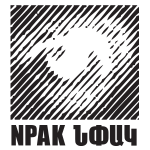This project presents Ani Gevorgyan’s interviews with some political prisoners related to the March One, 2008 events. She has deliberately dropped off the sections that refer to the “political” motives, as well as more tangible and well-known episodes of street protests. She has included only narrations of personal experiences of the detainees with other prisoners or the prison personnel.
In addition, Ani presents good many photographs taken during the resistance operations, in defense of the March One political prisoners.
In this regard, we witness writings that are reminiscent of Ani’s personal experiences from the days of arrest, as she too has been imprisoned.
By profession Ani is a journalist and a photographer. In this project we can see both. However, neither one is in traditional form. In interviews she does not try to create a comprehensive picture. Instead, she focuses on one concrete matter: The photographs are more of archival nature, relating rather to her personal memories.
In this project, I will not focus on Ani’s posture. It is not important whether she appears as a journalist, a documentarian or an artist. Each of these postures can be contested or confirmed. In the case of this project, I attach importance to something different.
She has shown others’ experiences based on her personal ones. During and after March One incidents, civil resistances have caused wide-spread discussions and debates on “political” processes. But the small stories from the detention centers were circulated within a handful human rights defenders and specific individuals.
It is one thing to be an activist, go to the street and take part in protest against the government during the day, and later, in the evening go back home and away from the law enforcement agents plan the rest of the day, thus dividing the time between resisting in the street and resting at home,
It is another thing when you are in detention and are in constant interaction with the prison personnel. In this case, the place to sleep, the exercise hour, the hiding of the smuggled telephone, the everyday trivia turn into fight against authorities.
This project illustrates the battle against the system, the regime, and the powers to be on a very personal and direct, albeit trivial basis. Contemporary parables make us divide our lives into parts, episodes where our lives can be political as well as personal.
This project gives us the opportunity of recalling and re-constituting a very distinct thing: For Institutional politics it is advantageous to move the manifestations of life out of its sphere of activities, branding them apolitical, thus monopolizing politics only to its activities.
This project is a magnificent manifestation of the concept that the personal and everyday-life trivia are essential political phenomena.
Curator: Gor Yengoyan
NPAK, 2019



























